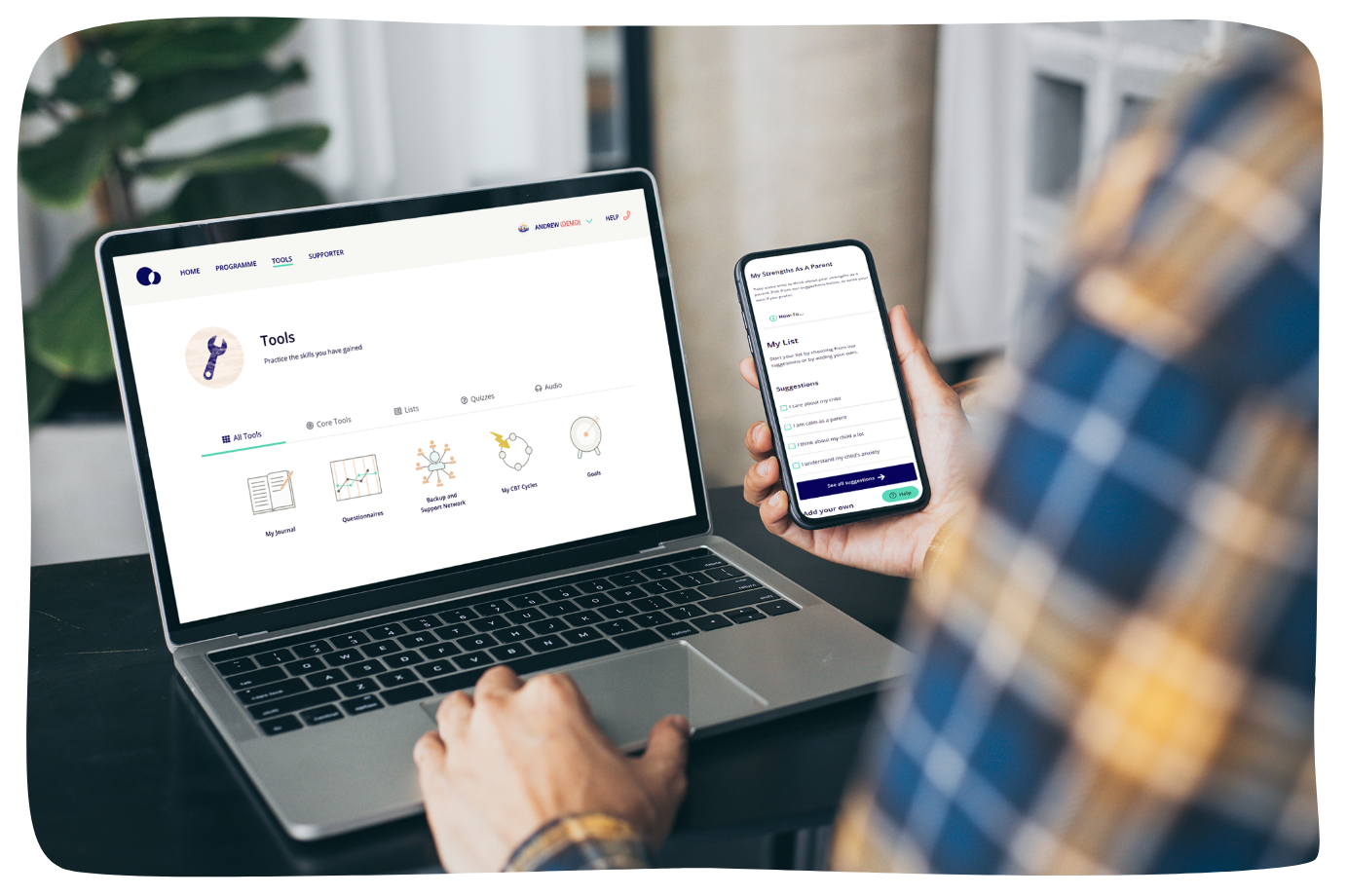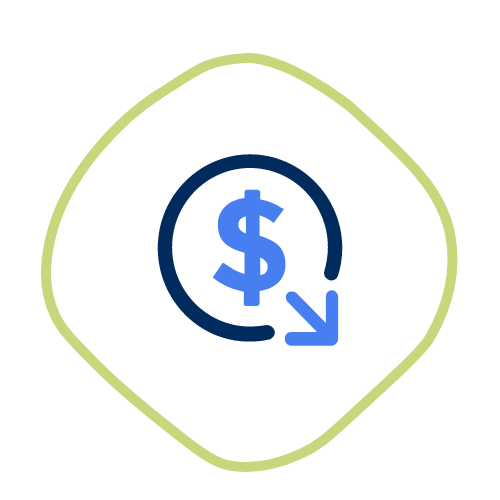Case Study
Case Study: How use of the SilverCloud® platform has resulted in estimated gains of £50 million to the NHS
SilverCloud® by Amwell® has been a proud partner of the NHS for 10 years, helping mental health services meet the ever-increasing demands for support.
Since its introduction to the NHS in 2013, nearly 700,000 people have been referred to the SilverCloud® digital therapy platform, resulting in substantial clinical and economic benefits.
Organisation

Industry
Scale
686,831 users of NHS Talking Therapies referred to the SilverCloud platform since 2013
Programmes
Over 30 specialised mental health programmes, addressing:
- Depression and anxiety disorders
- Chronic conditions
- Substance use
- Wellbeing
- Family issues

The Challenge
Mental health services have changed dramatically since the NHS launched 75 years ago. From the closure of Victorian-era asylums in the 60s, to the launch of IAPT (now NHS Talking Therapies) in 2008, attitudes and approaches to treating mental health conditions have progressed hugely. Yet, despite a spend of more than £15 billion in the past financial year (2022/23), NHS mental health services are facing unprecedented demand.1
6.4 million people were referred to NHS mental health services in 2021/2022, which is a 44% rise over five years. Despite a consistent focus on expanding capacity, the rise in demand coupled with the ongoing disruption caused by the pandemic, is resulting in sizeable treatment gaps. It’s estimated that in the current year, the NHS goal for 1.9 million people to access talking therapy services, amounts to just one quarter of people with a diagnosable need.1
Faced with such significant challenges, the NHS is placing an increased focus on the potential offered by digital solutions, to increase capacity and support the work of mental health professionals. In its Plan for Digital Health and Social Care 2022 policy paper NHS England proposed a £2bn investment to digitise the NHS as a top priority.2 The plan highlighted ‘supporting independent healthy lives’ as an important patient benefit. It also stressed the need to ‘accelerate adoption of proven tech’.
The Solution
Since its introduction to NHS Talking Therapies in December 2013 the SilverCloud platform has established itself as a key provider of “proven tech”. Delivering interactive and engaging internet-based Cognitive Behaviour Therapy (iCBT) via a secure app or website, the platform initially offered programmes to support adults with depression and anxiety, but has since broadened its scope.
Today, NHS Talking Therapies uses the SilverCloud platform to support people with a wide range of mental health conditions, via a suite of evidence-based iCBT programmes designed to meet individuals’ unique needs. Programmes can be used independently, or with the support of a Psychological Wellbeing Practitioner (PWP) to provide motivation and guidance via the SilverCloud secure messaging service.
The benefits offered to the NHS by the SilverCloud platform are broad:

Effectiveness and cost effectiveness
The SilverCloud platform is built on nearly 20 years of clinical research resulting in over 70 research papers published in peer-reviewed journals. In fact, as part of a commitment to further develop their evidence base, the in-house science team has partnered with the NHS on multiple studies. One large-scale pragmatic study, a randomised controlled trial (RCT) published in 2020, showed that three of SilverCloud’s iCBT programmes –Depression, Anxiety, and Depression and Anxiety – were both effective and cost-effective in terms of relieving symptoms of anxiety and depression within a routine NHS care setting.3

Efficiency
The SilverCloud platform integrates with NHS case management systems. This makes referrals and record keeping quick and easy. It creates significant efficiencies, helping to relieve some of the strain experienced by mental health teams that are caused by the challenges of recruiting and retaining staff, plus the overwhelming demand for services. Anecdotal reports also suggest that PWPs enjoy combining support work through the platform with face-to-face therapy. It offers a change of pace, and a chance to decompress, while still supporting patients.

Engagement
While effectiveness and efficiency are vital the patient experience is central to the success and long-term use of digital interventions. Research has shown that SilverCloud iCBT programmes have a 93% satisfaction rating with participants feeling supported and reporting positive gains after using them.4 iCBT also offers a new level of accessibility to mental health treatment; it fits into patients’ busy lives, removing the need to travel to appointments or take time off work. The modules can be completed in the patient’s own time and accessed 24/7. And crucially, referrals can happen almost immediately, once the patient has been assessed.

The Results
Since its launch in 2013, 686,831 people have used the SilverCloud platform within an NHS care pathway.
Patients using SilverCloud by Amwell are supported throughout the stepped care model – from those who are looking to better self-manage their symptoms, all the way to those receiving secondary care, who need support between and after therapy sessions. In all, the SilverCloud platform offers over 30 targeted mental health and wellbeing programmes.
With real-world evidence showing that the platform can reduce waiting times and enhance clinical efficiency within NHS Talking Therapies, data also indicates that it delivers substantial economic and operational benefits.5
Over the last decade, it is estimated that the SilverCloud® platform has resulted in approximately:

£1bn value of QALYs gained
Assuming this QALY gain is applicable to all SilverCloud iCBT programmes, it’s estimated that 14,286 years in perfect health have been gained, with a monetary value of just over £1bn.
14,286 QALYs gained, valued at £1bn+
The quality-adjusted life year (QALY) is used to determine the cost-effectiveness of care interventions intended to be used in the NHS. 1 QALY is equal to 1 year of life in perfect health.6 In England, the HM Treasury values each QALY gained at £70,000.7
Evidence from a randomised control trial (RCT), demonstrated that SilverCloud iCBT programmes (the Depression programme, the Anxiety programme, and the Depression and Anxiety programme) produced a predicted average of 0.0208 QALYs per person over 12 months.3 (The study compared patients using the programme with those facing the common experience of being on a waiting list for 8 weeks.)
The SilverCloud platform offers over 30 programmes, which have been used by a total of 686,831 people within NHS Talking Therapies since it was introduced 10 years ago. Assuming this QALY gain is applicable to all SilverCloud iCBT programmes, it’s estimated that 14,286 years in perfect health have been gained, with a monetary value of just over £1bn.

185,000 extra people treated
An extra 18,500 people per year were able to receive a course of treatment, or an estimated total of 185,000 in the past decade, since the platform was introduced.
Approximately 185,000 extra people treated
Resource impact evidence published by the National Institute for Health and Care Excellence (NICE), calculated that treating adults with the SilverCloud Depression programme saved an average of 2.1 appointments, compared to standard NHS Talking Therapies care options.8
Applying these benefits to all NHS users of the SilverCloud iCBT platform would suggest an extra 18,500 people per year were able to receive a course of treatment, or an estimated total of 185,000 in the past decade, since the platform was introduced.
.png?width=500&height=500&name=NHS%20Anniversary%20Stat%20_3%20(1).png)
1.5 million therapist hours saved
Standard care took on average 229.6 minutes of therapist time, while the SilverCloud Depression programme only took 92.8 minutes, saving 136.8 minutes (2.3 hours) of therapist time per course of treatment.
1.5 million therapist hours saved
The NICE evidence also looked at the therapist time taken on a course of treatment. Standard care took on average 229.6 minutes of therapist time, while the SilverCloud Depression programme only took 92.8 minutes, saving 136.8 minutes (2.3 hours) of therapist time per course of treatment.8
If we assume that the same benefits apply to all NHS users of the SilverCloud platform in the past decade, the time saving equates to 1,565,975 hours, or 958 working years (based on the typical working pattern of a PWP of 1,635 hours per year). This resource and effort saving would have allowed clinicians to allocate time to other areas of mental health services, helping to maximise patient outcomes, and support clinicians delivering care.

£50 million cost savings to the NHS
That’s the equivalent of funding 72 extra PWPs to work within NHS Talking Therapies for the last decade.
Cost savings of £50 million
Even taking into account the licence cost for the SilverCloud platform, in comparison to face-to-face therapy provision, it is estimated that these time savings equate to a cost-saving to the NHS of £49,286,993 over the past decade.
That’s the equivalent of funding 72 extra PWPs to work within NHS Talking Therapies for the last decade.9
Advice on data analysis and interpretation provided by Dr Matthew Franklin, Independent Senior Health Economist.
Book a demo
References
-
- https://www.england.nhs.uk/mental-health/taskforce/imp/mh-dashboard/
- Gov.UK (2022). https://www.gov.uk/government/publications/a-plan-for-digital-health-and-social-care/a-plan-for-digital-health-and-social-care.
- Richards, D., Enrique, A., et al. (2020). NPJ Digital Medicine 3, 85.
- Richards, D., Murphy, T., et al. (2016). Internet Interventions 5, 12-22.
- Duffy, D., Enrique, A., et al. (2020). Frontiers in psychiatry 10, 902.
- National Institute for Health and Care Excellence (NICE) (2022). www.nice.org.uk/process/pmg36/chapter/economic-evaluation.
- HM Treasury (2022). www.gov.uk/government/publications/the-green-book-appraisal-and-evaluation-in-central-governent/the-green-book-2020.
- National Institute for Health and Care Excellence (NICE) (2020). https://www.nice.org.uk/advice/mib215.
- https://www.pssru.ac.uk/unitcostsreport/







